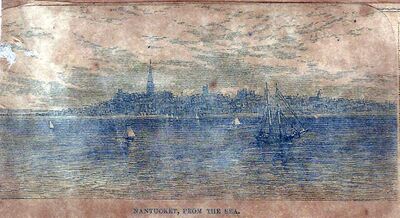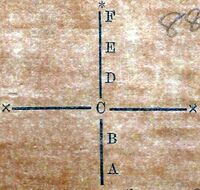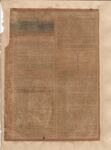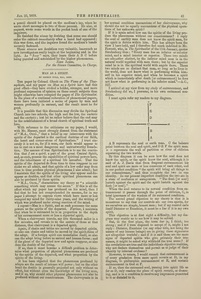
Nantucket, from the Sea
Man as a Spirit
The paper by Colonel Olcott on The Views of the Theosophists, and my paper on Man as a Spirit have had this good effect—they have evoked a bolder, stronger, and more profound expression of opinion on these occult subjects than might otherwise have occupied the pages of The Spiritualist. In the place of a continual reiteration of phenomenal papers, there have been initiated a series of papers by men and women profoundly in earnest, and the result must be for good.
It is possible that this discussion may divide the Spiritual Church into two schools, the high and the low, the esoteric and the exoteric; but let us rather believe that the end may be the establishment of a broad church of spiritual truth and love.
With reference to the criticisms on my paper, I would, with Mr. Massey, most strongly dissent from the statement of u M.A., Oxon.,” that a belief in our intercourse with the spirits of the departed is the cardinal doctrine of our faith, the heart and corner-stone of Spiritualism.” I trust sincerely it is not so, for if it were, our faith would appear to me to rest on a most dangerous and untrustworthy foundation. The essence of true Spiritualism is to me the conviction that I am a spirit, a part of the great Central Spirit, and, as such, possess the capabilities of spiritual powers here, and the inheritance of a spiritual life hereafter. That the spirits of the departed do from time to time reappear in our midst we all admit, and that spirits of a low order may from time to time produce physical phenomena I also admit; but I maintain that the spirits of the living also appear and disappear as doubles, and that other spiritual phenomena can also be produced by these spirits.
“M.A., Oxon.,” characterises my theory as “a scientific something which may amuse the savan.” If this is all the effect which my paper has produced on his mind, then I feel that he has not comprehended its essence, for in my paper I attempt to express views which have more or less occupied my mind for thirty-nine years, and the writing of which was produced under strong emotion of the mind.
I repeat—Man is a Spirit, and as such possesses the same powers as the spirits of the departed. Further, I maintain that when he is entranced he is in proportion to the depth of his entrancement more or less a departed spirit.
When a clairvoyant travels, say five thousand miles in a few minutes, and reveals to us the secrets of those at that distance, that clairvoyant is a departed spirit.
Again, if chairs and tables are moved by departed spirits, so also can chairs and tables be moved by the spirit-force of the adept. If a foreign spirit can materialise itself, so also can the adept bring before us animal and human forms; and if the ghost of the departed now and again reappear, so also does the double of the living.
If so, then it must become a difficult problem to determine what proportion of physical phenomena are produced by the spirits of the departed, and what proportion by the spirits of the living.
It has been objected that the phenomena produced by adepts are the result of intense will power; but on the other hand the double is generally projected not only without an effect, but without even the knowledge of the living man, and if so, why should other physical phenomena not also be produced, without our consciousness. The clairvoyante is in her normal condition unconscious of her clairvoyance, why should she not be equally unconscious of the physical operations of her unknown spirit?
If it is again asked how can the spirits of the living produce the phenomena without our consciousness? I reply the soul or earthly man does not know the spirit man, for the spirit is hidden within him. This has always been the view I have held, and I therefore feel much indebted to Mr. Fawcett, who, in The Spiritualist of the 11th January, quotes Swedenborg thus: “Every man has an inferior or exterior mind, and a mind interior or superior. These two minds are altogether distinct, by the inferior mind man is in the natural world together with men there; but by the superior mind he is in the spiritual world with angels there. These two minds are so distinct that man, so long as he lives m the world, does not know what is performing within him- self in his superior mind, and when he becomes a spirit which is immediately after death [or entrancement] he does not know what is performing in his inferior mind.”—A.C., 527.
I arrived at my view from my study of entrancement, and Swedenborg did so, I presume, in his own entranced condition. I must again refer my readers to my diagram.

A B represents the soul or earth man. G the balance point between the soul and spirit, and D E F the spirit man. X X represents the wall of partition or river of oblivion separating the two worlds.
By this diagram it can be seen how the soul does not know the spirit, or the spirit know the soul, although it is said of A. J. Davis that from frequent entrancement his soul and spirit are more or less conscious of each other, and in our perfect condition “the spirit will bring all things to our remembrance,” and thus complete the two in one identity. In our present imperfect condition the two are in a state of confusion or antagonism. “The flesh [or soul] lusteth against the spirit and the spirit lusteth against the flesh [or soul].”
When the soul returns to its normal condition from entrancement it passes through the point of oblivion, C, in total ignorance of the wisdom of its entranced condition.
The second grand objection to my theory is that it is monstrous to say that our controls are our own spirits, for we ourselves are simple, honest men; but if my control calls itself Dictator or Excelsior, it must be a liar if it is my own spirit.
This objection is at first sight a difficulty, but my diagram may enable us to see how it may be solved.
But, in the first place, the term liar is, I think, too strong; and if I were disposed to accept of it, might I not reply: Dictator, Excelsior (or any other title, not being the names of any human beings) are in giving these signatures not altogether truthful; and if it is said these are the mere signs of departed spirits who give privately their true names, it might be asked why withhold the true name? If the revelations are true and the individuals objective realities, why not declare themselves and permit us to judge of their identity by internal evidence?
However, to return, I would remark that entrancement is of every gradation from mere spirit reverie at D, in my diagram, to philosophic entrancement at E, and ecstatic entrancement in God at F.
If so, then the entranced soul, passing into spirit life as far as D, only reaches the place of spirit reverie, or dreaming, and is in a condition to receive any impression presented to it or dictated to it.
<... continues on page 4-162 >
Editor's notes
-
London Spiritualist, No. 283, January 25, 1878, pp. 41-2

